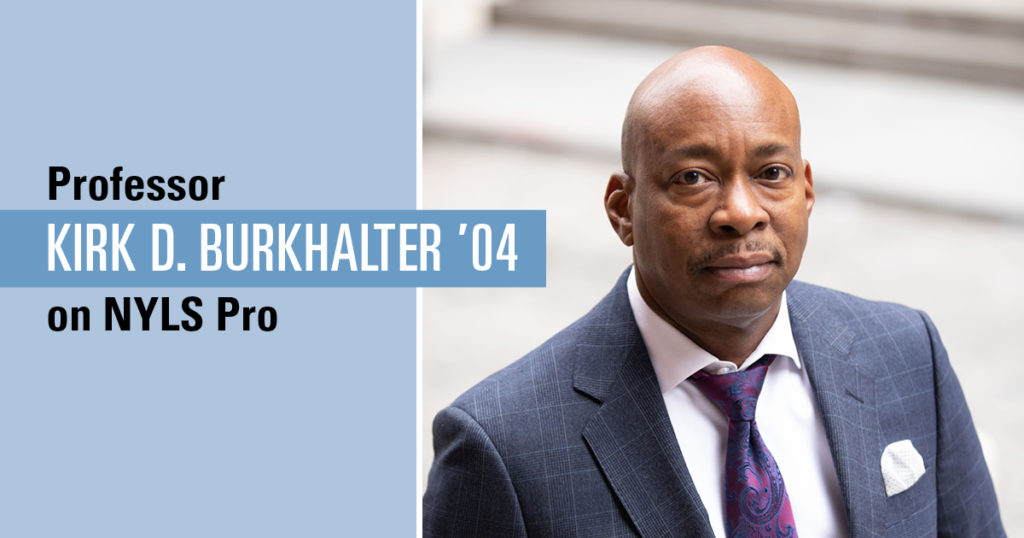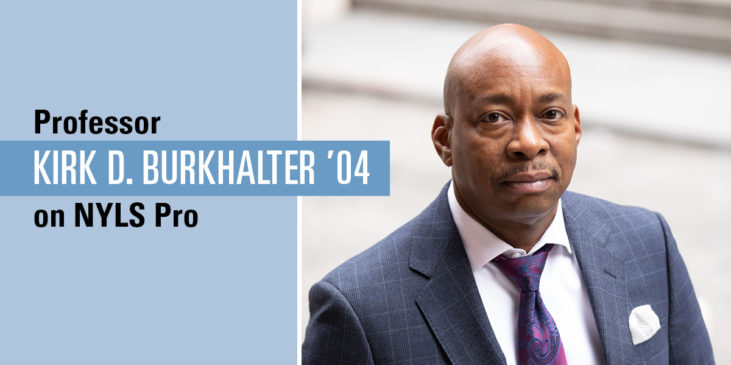
Earning a law degree while working full-time has always required extraordinary discipline and determination. And it is for those reasons that Evening Division graduates are often highly desirable in the legal job market, and have led tremendously successful careers. However, in recent years, advances in digital communications and the ways in which we work have changed employer expectations of working professionals. This has caused law schools to innovate to make obtaining a degree ever more compatible, though no less rigorous, with the lives these students lead. That is why New York Law School (NYLS) has introduced NYLS Pro, a modern take on its 128-year-old Evening Division. NYLS Pro offers a blend of in-person and remote learning to allow students to better bridge the work, home, and school divide and ensure that opportunities to bring new talent, experience, and diversity into the profession are not diminished but rather increased.
Making NYLS Pro A Reality
In 2019, with a significant grant from AccessLex Institute, Dean Anthony W. Crowell, who himself graduated from an evening division, appointed a Task Force to begin a full-scale review to identify ways to expand evening student success, including bar success. When the NYLS Task Force began their review just before the pandemic, Kirk D. Burkhalter ’04—a full-time Professor at NYLS who is also an Evening Division graduate and often teaches evening students—was an obvious choice to serve as Chair, with Co-Chair Dr. Joanne Ingham, NYLS Vice President for Institutional Research.
Professor Burkhalter spoke more about the Task Force’s research and recommendations that fueled the development of NYLS Pro to fit the needs of the busy 21st-century professional, as well as his own experiences with the Evening Division.
Bold Changes for Modern Needs
The Task Force’s early analysis focused on ways to design and implement interventions responding to challenges faced by evening students. One of the first questions they addressed, Professor Burkhalter said, was “Is there any way that the work of evening students can be done, in part, online? Given that folks are typically rushing from their 9-to-5 job to attend class by 6:00 p.m., it can be a very demanding schedule.” Then the pandemic hit, requiring NYLS to begin teaching exclusively online. At that moment, Dean Crowell issued guidance to all faculty to inspire them to use the challenges of the pandemic to innovate new teaching methods and ways to serve our students generally.
“We’ve learned a lot about remote teaching since the beginning of the pandemic that’s fueled some of the changes to the evening program,” Professor Burkhalter said. “Not only about the effectiveness of remote teaching, but how to avoid pitfalls. I can’t tell you how many meetings I’ve had over the phone with evening students over the years, but it was a huge leap to have more meetings face-to-face through Zoom. The pandemic sped up the process of bringing the division fully into the 21st century, allowing us to understand how to strategically reduce the time required in-person on campus, but not the rigor or personal connections required of the overall experience.” Thus, NYLS Pro offers a nice balance of in-person and remote learning options.
Professor Burkhalter also noted that while “some classes are remote for students’ convenience, it’s still important to make those connections with your classmates and your professors and administrators who will become your professional resources.”
A key aspect that the Task Force considered was how to help evening students effectively prepare for the bar exam. Many evening students simply can’t take two months off of work to study for the bar exam because of finances or their employment situation, so the Task Force proposed restructuring the School’s rich bar preparation offerings, which effectively begin in the first year of study. The program will now culminate in an intensive final “bar study” semester for most, if not all, evening students.
“Most evening students who work full time and succeed in passing the first time, succeed with a tremendous amount of support from their family and friends. With this new program, students begin the final stages of studying for the bar from January until graduation in May, and then continue with an additional two months of commercial bar prep, supported by additional resources and tutorials from the School. They will have a continuous seven month on-ramp to prepare for success on the July bar exam, so they can achieve their goals,” said Professor Burkhalter.
Along with significantly increased flexibility—evening students will come to campus three days per week instead of four—and continued dedicated academic and career advising services, which will be available both in person and remotely, including during off hours and weekends, these changes will set evening students up for long-term personal and professional success.
Recollections of the Evening Division
Professor Burkhalter offered some personal recollections on the Evening Division. “It can be intensive to work all day, and then attend law school by night. When I started the program, I was a Detective working in the NYPD’s Intelligence Division, and my last four years with the police coincided with my four years of law school. I remember having conversations with my kids about homework over the phone before I had to walk into class at 6:00 p.m., and then I would sometimes spend entire weekends in the library, finishing the readings for the week and studying with classmates.”
One of the things that stands out for him is the diversity of backgrounds he encountered. “Being a member of the Police Department, as is the case with a lot of other professions, it’s easy to become surrounded by people of similar interests and schools of thought. But in the Evening Division, my classmates were also city workers, medical professionals, media professionals, entrepreneurs, and veterans, all coming from a wide range of backgrounds. Instantly, I was able to broaden my horizons with regard to my colleagues. It really helped me reframe my thinking.”
Professor Burkhalter believes the changes through the new NYLS Pro are the next step forward for the Evening Division’s work propelling resilient and dedicated professionals who are determined to begin a bright legal career. “I really enjoyed being an evening student. I loved going to law school, and I’d walk in every day excited to learn and walk out with new knowledge. I met lifelong friends from the first day of law school,” he recalled. “When you run into someone who was an NYLS evening student, it’s an instant connection, even if you haven’t met before.”

